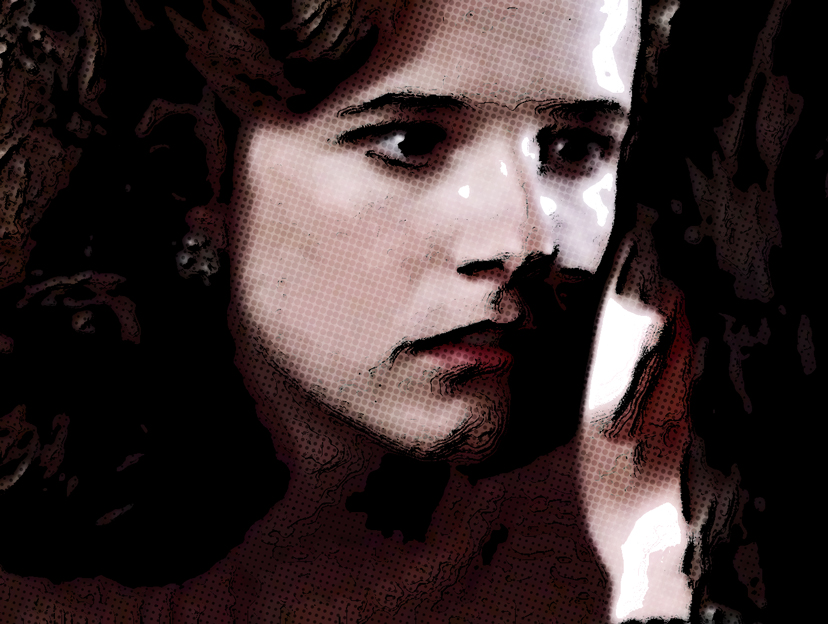
Purple is the Color of Love:
Love, authentic love in the Lacanian sense, is event in its purest form according to Zizek. Love in this instance is an important precedence to understanding the very perception of truth within the realm of ideology. To begin one just has to believe that true love does exist and it is an event which ruptures and reconfigures the very world that one lives in. It is precisely this power that makes love so revolutionary and often times extremely terrible as Zizek would say.
Love, true love, is an event without any coordinates, in itself completely unconditional. It is precisely because of its nature, it cannot and must not be perceived as such. To explain I will use a rather simple example:
I have a job interview coming up and I require a white shirt to go to this interview in. Even before going to the store, I, already in my mind, have a set coordinates of what I am looking for. A detailed list of attributes like the specific tone of white I wanted, the shape of the collar, even to the minute details like how the buttons should look like even before I see a single shirt. The most ideal and perfect conditions for what I am searching for and anything that deviates from that spectrum acts only as a compromise. Once I get to the store, for whatever reason, as I was searching for The shirt, I caught a glance of a suit jacket. Having caught my eye I tried it on out of response in being in a clothing store. Surprisingly it fits like a glove, of course my second reaction consideration my socio-economic class I immediate look for the price of said jacket. Lo and behold, the jacket is 75% off, the season is over and it is last of its stock, clearance item. At that specific moment, the very set of conditions needed to meet my expectations are gone. The perfect shirt is not a shirt but a suit jacket, something that I was completely not looking for. I could give less of a crap about that shirt, perhaps I will leave the store with one because of the interview, but at that very moment the only thing that made my day would be that suit jacket.
True love is precisely that, an event that retroactively creates the conditions for its very existence. Upon finding that suit jacket, the series of events that has past the point in history resurfaces and creates its very own narrative in order to explain that very event:
I had to have gone on Friday, end of the week, I was busy so I went that day in the evening. I had to have gone to have caught that last subway, if I missed it the story would be closed. I got there an hour before they close, it would be gone if I didn’t get it, because it was on sale last of its stock. If I came too early, it would still be in season with no discount, etc, etc, etc.
It was if at that very point in time, it was meant to be. You were meant to buy that suit jacket. Yet none of those conditions existed prior to finding it and it is only by finding it could those conditions exist or have existed. If not, those very same conditions would be meaningless and would only contribute to the noise of history, an aspect of time which in essence never truly existed without a consciousness, an uneventful day of the very narrative of your life. Love in this instance would be as Zizek explains; it is a need that we didn’t know we had because we never knew it existed. Only when we find it did we know we always needed it. Hence true love is always unconditional for it had no coordinates to speak of and in this light love is an event apriori to the very subject. Not only did you meet this person and you fell in love with them, it is only at that very moment can you realize that not only did you love this person now but that you have always loved this person even before you met them. You always had this need, which this person fits into, regardless if you were aware of it; it’s apriori. You had always have is the time frame that can put love into cognitive tense or as Zizek puts it always already have. There is no definitive point in time that it occurs, it only becomes apparent later after it as occurred. It is precisely this quality of love as an event that causes relations to begin and end even before one is cognizant of it happening. Even before the first encounter, love already happened; even before the last conflict, love already ended. That is why we fall, as Zizek explains, when we fall in love, it is an abrupt violent intrusion into the very course of our lives that puts the subject within a suspension of all moral and ethical ties, or as Zizek would put it, love is the perpetual state of exception. Quite simply, if you have fallen in love you are now trapped in the dream of the other and “if you’re trapped in the dream of the other, you’re fucked!” (si vous etes pris dans le reve de l’autre, vous etez foutu! – Gilles Deleuze). It is this violent fall, this miss perception that makes love possible, without the fall, one cannot love.
Counting Zeros:
If I had gone to the store to look for the suit jacket in the first place, I might ended up not finding anything at all because of the preconceived list of credentials that would have made my perception of that very same jacket insufficient, incomplete to fill the initial lack that stems from my own impossible desire. This list of conditions, a natural reaction to the act of searching given the digital age, creates a set of paradoxical problems for love. The trend of using algorithms to create matches, the current trend in online dating, runs directly into this problem. How does one code for an attribute that they didn’t even know it exists until the moment that it is found? The apriori nature of love, its ability to retroactively recreate its conditions for existing, renders these algorithms completely ineffective. Because of this, one can run up to any random stranger and still have the same statistical chance that this person will be the love of their life. Therefore every encounter with a potential partner is always a random coin toss of compatibility. In relying on a set list of conditions, it forces one to focus on details too specifically to see the complete picture. There is no logical and rational reason for true love and in quantifying the very experience one gives up the choice to fall, to love with out the fall is to never love at all; we must fall.
All these concepts becomes more defined once we give thought on the concept of time and the very narratives of our lives’. There is no future and there is no past, those two periods of time only exists within a frame of consciousness. One remembers the past and anticipates the future. This process works in a short circuit where at the core of its impasse lies the present, the very experience of time is a collapse of the circuit. At the moment when one falls in love, one experiences this “weight” of time, time given substance; in other words, the person reminisces this stranger, remembers something similar from the past from an impossible future of one that has yet to exist, the act of total recall. But this experience comes to the subject not as a clear image of thought, but one of misconception. Only in this sense can it be absolute, one that escapes Deleuze’s image of thought, where sense is taxed to its very limit by this very intrusion into the self, this absolute idea, this absolute event (a future without an image) can only come through in this regard, not as truth but as an opportunity to truth where truth is the lie. An unthinkable thought forced upon us in which we cannot grasp yet forced to think. This concept was explained by Zizek though his joke with the Jewish and Polish man on a train:
There is a well-known, very Hegelian joke that illustrates perfectly the way truth arises from misrecognition – the way our path towards truth coincides with the truth itself. At the beginning of this century, a Pole and a Jew were sitting in a train, facing each other. The Pole was shifting nervously, watching the Jew all the time; something was irritating him: finally, unable to restrain himself any longer, he exploded: ‘Tell me, how do you Jews succeed in extracting from people the las small coin and in this way accumulate all your wealth:’ The Jew replied: ‘OK, I will tell you, but not for nothing; first, you give me five zloty (Polish money).’ After receiving the required amount, the Jew began: ‘First, you take a dead fish; you cut off her head and put her entrails in a glass of water. Then, around midnight, when the moon is full, you must bury this glass in a churchyard…’ ‘And,’ the Pole interrupted him greedily, ‘if I do all this, will I also become rich?’ ‘Not too quickly,’ replied the Jew; ‘This is not all you must do; but if want to heard the rest, you must pay me another five zloty!’ After receiving the money again, the Jew continued his story; soon afterwards, he gain demanded more money, and son on, until finally the Pole exploded in fury: ‘You dirty rascal, do you really think I did not notice what you were aiming at? There is no secret at all, you simply intend to extract the last small coin from me!’ The Jew answered him calmly and with resignation: ‘Well, now you see how we, the Jews…”
The subject’s first confrontation with the truth is always with anger, frustration and confusion for the point was completely missed. The truth was already revealed to us. We are too late, one step behind, not of our fault but we need to be in order for the truth to be one step ahead of us, we must first take a misstep. One caught in the fall, interprets it as such, a catastrophe without explanation, logic, or sense; all smokes and mirrors in a grand deception. Yet it is precisely at this moment we can for the first time come in contact with the truth. If one tries to bypass this initial miss conception, they end up losing the truth all together, one gets nothing. The example that Zizek used to illustrate this point was the story Pride and Prejudice by Jane Austen:
it is Jane Austen who is perhaps the only counterpart to Hegel in literature: Pride and Prejudice is the literary Phenomenology of Spirit; Mansfield Park the Science of Logic and Emma the Encyclopaedia… No wonder, then, that we find in Pride and Prejudice the perfect case of this dialectic of truth arising from misrecognition. Although they belong to different social classes – he is from an extremely rich aristocratic family, she from the impoverished middle classes – Elizabeth and Darcy feel a strong mutual attraction. Because of his pride, his love appears to Darcy as something unworthy; when he asks for Elizabeth’s hand he confesses openly his contempt for the world to which she belongs and expects her to accept his proposition as an unheard-of honour. But because of her prejudice, Elizabeth sees him as ostentatious, arrogant, and vain: his condescending proposal humiliates her, and she refuses him.
This double failure, this mutual misrecognition, possesses a structure of a double movement of communication where each subject receives from the other its own message in the inverse form: Elizabeth wants to present herself to Darcy as a young cultivated woman, full of wit, and she gets from him the message ‘you are nothing but a poor empty-minded creature, full of false finesse’; Darcy wants to present himself to her as a proud gentleman, and he gets from her the message ‘your pride is nothing but contemptible arrogance’. After the break in their relationship each discovers, through a series of accidents, the true nature of the other – she the sensitive and tender nature of Darcy, he her real dignity and wit – and the novel ends as it should, with their marriage.
The theoretical interest of this story lies in the fact that the failure of their first encounter, the double misrecognition concerning the real nature of the other, functions as a positive condition of the final outcome: we cannot go directly for the truth, we cannot say ‘If, from the very beginning, she had recognized his real nature and he hers, their story could have ended at once with their marriage.’ Let us take as a comical hypothesis that the first encounter of the future lovers was a success – that Elizabeth had accepted Darcy’s first proposal. What would happen? Instead of being bound together in true love they would become a vulgar everyday couple, a liaison of an arrogant, rich man and a pretentious, empty-minded young girl. If we want to spare ourselves the painful roundabout route through the misrecognition, we miss the Truth itself: only the ‘working-through’ of the misrecognition allows us to accede to the true nature of the other and at the same time to overcome our own deficiency – for Darcy, to free himself of his false pride; for Elizabeth, to get rid of her prejudices.
These two movements are interconnected because Elizabeth encounters, in Darcy’s pride, the inverse image of her own prejudices; and Darcy, in Elizabeth’s vanity, the inverse image of his own false pride. In other words, Darcy’s pride is not a simple, positive state of things existing independently of his relationship with Elizabeth, and immediate property of his nature; it takes place, it appears, only from the perspective of her prejudices; vice versa, Elizabeth is a pretentious empty-minded girl only in Darcy’s arrogant view. To articulate things in Hegelian terms: in the perceived deficiency of the other, each perceives – without knowing it – the falsity of his/her own subjective position; the deficiency of the other is simply an objectification of the distortion of our own point of view.
This is a core concept, the dialectical condition of truth, in understanding both love and ideology. It is imperative that one must not know, one cannot see the one they love for whom they are. One must miss the future, the misconception is the truth, one that must be misinterpreted. To explain one must recall the Hollywood classic movie with Michael J. Fox.
Back to the Future:
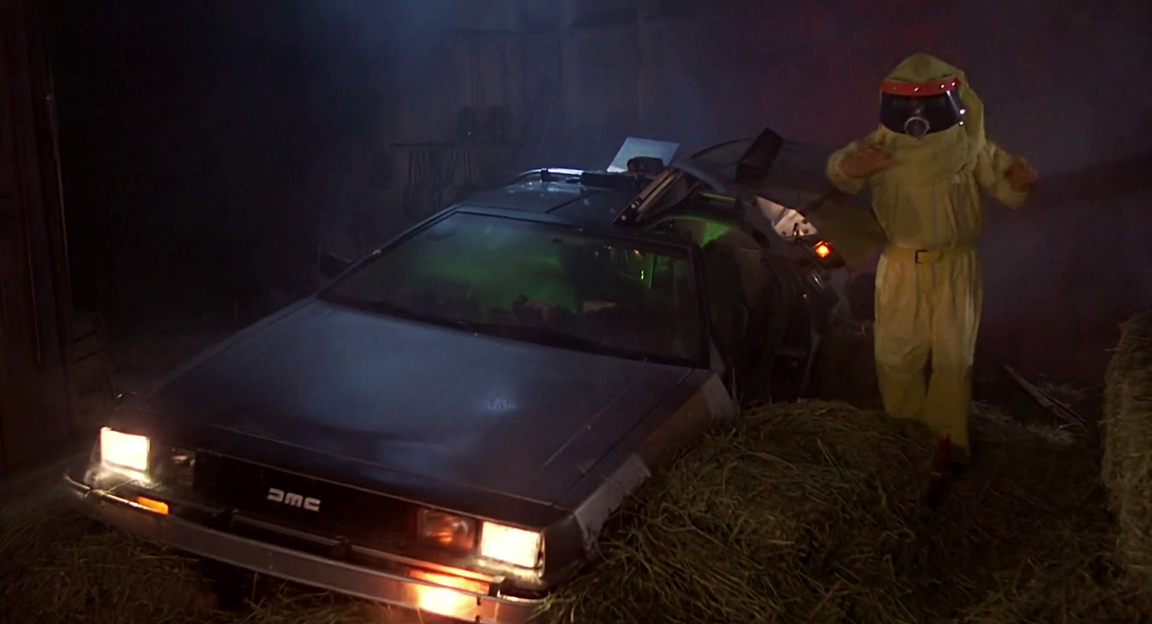
The only means of going to the future is going back to the past first. Hence the movie is called “back” to the future for the only way to go to the future is to go “back” to it. One must miss the future first, if not there wouldn’t be a future to go to so to speak.
The movie Back to the Future (1985) is a good example of how love and ideology works. The first encounter of love must be perceived as a misconception. Where clarity in this instance will lead to the loss of one’s (borrowing the words Zizek) ontological consistency. The plot of the movie can be summarized as Marty (Michael J. Fox) the protagonist of the story accidentally goes back in time and accidentally interrupts his parents from falling in love causing himself to slowly disappear by changing the course of the future, one where his parents never met, fall in love and gave birth to him.
Say for example, someone from the future, specifically your child comes back to the past (your current present) and tells you exactly what is going to happen, the exact person you are supposed to meet, fall in love and live the rest of your life with. What can you do at the moment? What would that change? Would it make the pursuit of that person easier? Would it even be possible to even fall in love at the point? Would you even believe them? Here we have the perfect example where the first encounter must be a misconception, if not the truth would be completely lost. It was always already in place. Yet the truth here, when confronted as truth is always missed as such. In other words, to a subject that has already (or always already) fallen in love, even to the extent where one can see the future, to the point of clarity where one’s own child comes back to the past to set you up with the person you love, the struggle of the moment is still present. One must always fall into it. The struggle, can’t or, never ends, it must not end or you fail to fall into it. The movie’s main struggle is with this truth, knowing the truth about the truth changes nothing. George McFly (Crispin Glover), Marty’s father even with the help of his own son from the future, struggles to win the heart of the women he loves Lorraine Baines (Lea Thompson). Even when Marty knows the whole truth about his parents and how they met, he was absolutely powerless to bring them together. What Marty does know is that he cannot under any circumstance reveal who he is to them, to the point at the risk of making love to his own mother, and tell them about their future and who he really is.
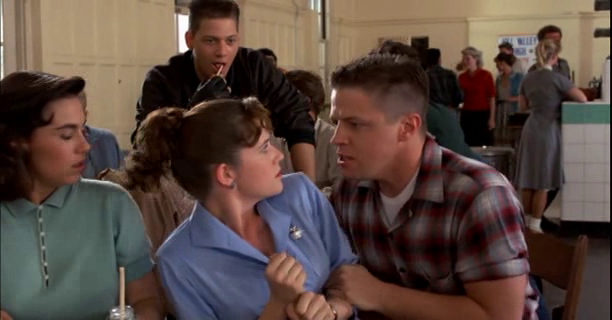
Biff: You know you want me to give it to you. Loraine: Shut your filthy mouth.|I’m not that kind of girl. Biff: Maybe you are|and you just don’t know it yet. Loraine: Get your meat hooks off of me.
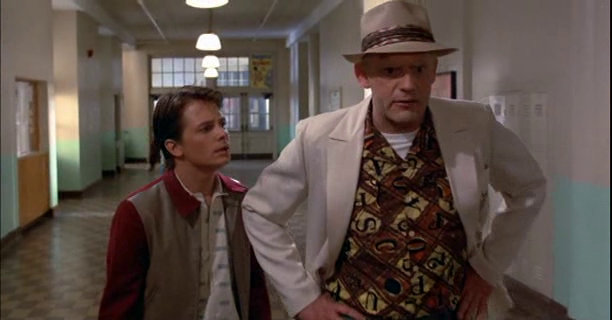
Doc: Apparently, your mother is amorously infatuated with you, instead of your father. Marty: Whoa. Wait a minute, Doc. Are you trying to tell me that my mother has got the hots for me? Doc: Precisely. Marty: Whoa. This is heavy. Doc: There’s that word again. “Heavy. ” Why are things so heavy in the future?
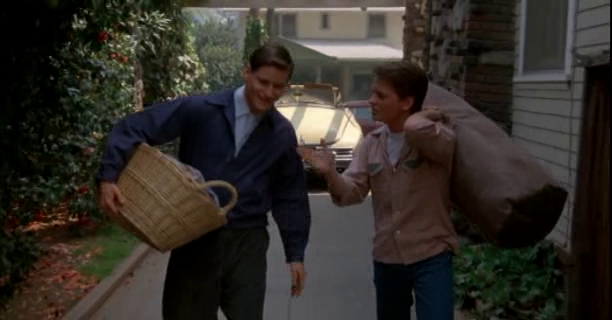
George: I still don’t understand. How am I supposed to|go to the dance with her… if she’s already going|to the dance with you? Marty: Well, because, George,|she wants to go with you. She just doesn’t know it yet.
Much like the cliché question does the suit make the man or the man make the suit the answer is man (just a figure of speech) in terms of love. These very attributes and conditions are meaningless. You didn’t fall in love with this person because of a set of conditions and attributes they might have, it is these conditions and attributes are important to you only because you are in love with them. Causation happens before cognition, this is already proven by current neurosciences. As in psychoanalysis, one believes before there is logical reason to form a belief. One is already in love, before one even knows it. The very grace of love illuminates the lover’s qualities to the subject.
Any direct confrontation with the Real, one ends up losing it. When someone realizes that the very period of time they dwell in is the very collapse of time, they lose their sense of reality. Truth here is unsubstantial in two ways. George McFly was always already destined to be with Lorraine, but since this ‘fate’ came into gaze, our gaze, into the consciousness of their son Marty, that another misinterpretation was needed to allow that actual event to take place. One to fool our eyes and deceive their son. One can compare this with the act of revolution. Even if a revolution is bound to fail, during that act of revolution one can remember, in the Benjamin sense, the messianic properties of the act in this revolution’s failure it builds the very conditions of a true revolution in the future; this revolution had to fail in order for a future true revolution, one that succeeds. Yet it is precisely this point that must be avoided during the revolution, even if one is conscious enough to understand this point about revolutions, one must be fooled, one must believe at that moment of the revolution at hand even if it is a failure, if not the point of the revolution will dissolve itself. The revolution would just simply fail, period. One can compare this concept with the Iching concept of change. Change is something that can only be experienced in a past tense, only when you detect that something has already change could you know that there was change. During the process of change one is clueless that change is happening, that things are changing. It is like being within the eye of the hurricane, one perceives change one step behind, one step too late, the subject can only experience change only when change has already taken place.
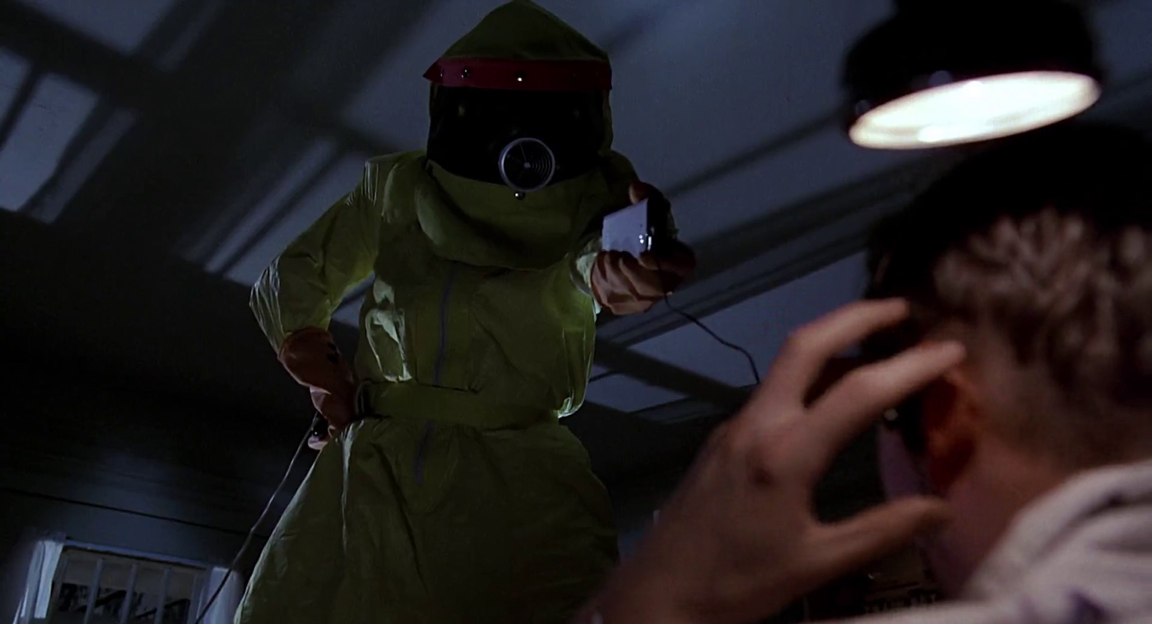
Marty: What made you change your mind, George? George: Last night, Darth Vader came down from Planet Vulcan and told me that if I didn’t take Lorraine out, that he’d melt my brain. Marty: Let’s just keep this brain-melting stuff to ourselves, okay? George: Oh, yeah. Yeah. The old cliché saying of give a man a fish and feed him for a day, teach a man to fish and feed him for life lends certain wisdom in love. To a certain degree, one must just take the leap of faith and just do it. One must overcome the initial inhibition in the first place that has led to stagnation. Much like how Zizek explains revolution, one never knows when the right time is precisely because of this retroactive becoming of time. Therefore every time is the right time, one must not wait for an opportunity. One cannot wait for something that always already there.
The qualities of George McFly was always inconsequential, be it the coward introvert, or the brave hero, both fates are the same, he ends up with Lorraine. Their love was always apriori, it is that they just don’t know it yet. Love is a one directional predestined event that emanates from the very same subject. When one falls in love, it is not because of the Other’s qualities, the very qualities that the subject is composed of, but you love them because you inserted into them the very qualities that you love, the aspect that makes to more then simply who they are. Love is not simply the occasion where one feels ‘right’ or happy, this fall, this collapse acts more then that, it gives one the access of the substance that makes them more then what they are. Hence, when love is gained and love is lost, this comes from within the subject not the very object of their desire. The person is either a yes or a no from the very start of any relationship and there is nothing that one can prove with their qualities, ie change their appearance, interests, etc. There was nothing that George McFly could have done to cause Lorraine love him, this love had always came from her and does not come from a quality within himself. This same could be said vice versa as explained by Zizek:
More generally, when one is passionately in love and, after not seeing the beloved for a long time, asks her for a photo to keep in mind her features, the true aim of this request is not to check if the properties of the beloved still fits the criteria of my live, but, on the contrary, to learn (again) what these criteria are. I am in love absolutely, and the photo a priori CANNOT be a disappointment – I need it just so that it will tell me WHAT I love… What this means is that true love is performative in the sense that it CHANGES its object – not in the sense of idealization, but in the sense of opening up a gap in it, a gap between the object’s positive properties and the agalma, the mysterious core of the beloved (which is why I do not love you because of your properties which are worthy of love: on the contrary, it is only because of my love for you that your features appear to me as worthy of love). It is for this reason that finding oneself in the position of the beloved is so violent, traumatic even: being loved makes me feel directly the gap between what I am as a determinate being and the unfathomable X in me which causes love. Everyone knows Lacan’s definition of love (“Love is giving something one doesn’t have…”); what one often forgets is to add the other half which completes the sentence: “… to someone who doesn’t want it.” And is this not confirmed by our most elementary experience when somebody unexpectedly declared passionate love to us – is not the first reaction, preceding the possible positive reply, that something obscene, intrusive, is being forced upon us?
In a kind of Hegelian twist, love does not simply open itself up for the unfathomable abyss in the beloved object; what is in the beloved “more than him/herself,” the presupposed excess of/in the beloved, is reflexively posited by love itself. Which is why true love is far from the openness to the “transcendent mystery of the beloved Other”: true love is well aware that, as Hegel would have put it, the excess of the beloved, what, in the beloved, eludes my grasp, is the very place of the inscription of my own desire into the beloved object – transcendence is the form of appearance of immanence. As the melodramatic wisdom puts it, it is love itself, the fact of being loved, that ultimately makes the beloved beautiful.
This leads to what Zizek calls absolute beauty. It is important to grasp the difference between reality and the Real. In this case, when one looks at their lover, their lovers’ are more than simply just another person an alternative image is represented. In reality, human beings are nothing but talking sacks of feces or the similarity between the human being and a bucket of water with a lump of coal in it is molecularly identical. Yet any confrontation with the reality, loses all perspective and conception of the human, of the Real, the very aspect which gives it its true form. In search of these qualities within their partner is a loss cause. One can never know why or what they love, fantasy realized is nightmare; one cannot see and one cannot “unsee” what have been seen. Zizek explains this concept with one of Agatha Christie’s stories:
Hercule Poirot discovers that an ugly nurse is the same beautiful person he met on a trans-Atlantic voyage: she had merely put on a wig and obfuscated her natural beauty. Hastings, Poirot’s Watson-like companion, sadly remarks how, if a beautiful woman can make herself appear ugly, then the same can also be done in opposite direction: what, then, remains in man’s infatuation beyond deception? Does this insight into the unreliability of the beloved woman not announce the end of love? Poirot answers: ‘No, my friend, it announces the beginning of wisdom.’ Such a scepticism, such an awareness of the deceptive nature of feminine beauty, misses the point, which is that feminine beauty is nonetheless absolute, an absolute which appears: no matter how fragile and deceptive this beauty is at the level of substantial reality, what transpires in/through it is an Absolute—there is more truth in the appearance than in what is hidden beneath it.
One must not confront the very reality that lies behind the object of their desire. This is precisely where ideology is fundamental in our common understanding of reality. When one deals with ideology, it is not simply a lie, a deceptive mask which covers the truth, the truth of the matter is all there is behind the veil is ideology. Ideology is the very space, the gap, which allows us to maneuver around the very inconsistencies of our reality. The truth one looked for, is merely an empty space with no logic or reason; it is only with ideology can we continue functioning on a day to day basis without succumbing to madness. When one tries or propagates the concept of revealing the truth behind any ideology one faces the abyss. In the rupture of the ideological mask, one ends up with nothing, not the truth, not understanding, but utterly nothing. One can compare it to a tumour, once found, the entire region is removed, one cannot keep the ‘good’ bits and remove the bad. Much like the dialectical concept of truth where misconception and conception is a simultaneous event, ideology is needed to keep the consistency, or what little there is of it, of our reality intact. Therefore when a patent approaches a psychoanalysis to confront their problems, the doctor does not cure the patient. The very cure could be the very end of them. The very qualities that make them human, distinct, unique, etc are simultaneously the very problem one faces. Hence, the role of the doctor is to lead the patient to confront their desires, live with them, their very problems are them.
When one confronts their lover, this exact principle applies. One must not look directly, one must not look too hard. One must contain one’s desires from fulfillment much like the example Zizek quoted from Dante’s Inferno:
When, in Turgatorio, Dante focuses his gaze on the beloved Beatrice, oblivious of everything else, divine voices quickly reproach him for staring too fixedly (‘troppo fissol1) – this frozen gaze which blurs the proper view of the totality of Being designates the original sin of looking.
Tranced by the holy smile that drew me there
into the old nets, I forgot all else –
my eyes wore blinkers and I could not care.
when suddenly my gaze was wrenched away
and forced to turn left to those goddesses:
‘He stares too fixedly!’, I heard them say. (32:4-9)
This fixation on the beloved object (or, more to the point, on some scene of the Other’s jouissance) which congeals it, wrenches it from its context, and thus destabilizes, throws off the rails, the balanced flow of things, stands for the violent cut of anamorphosis which, at the visual level, sustains the gap between reality and the real.
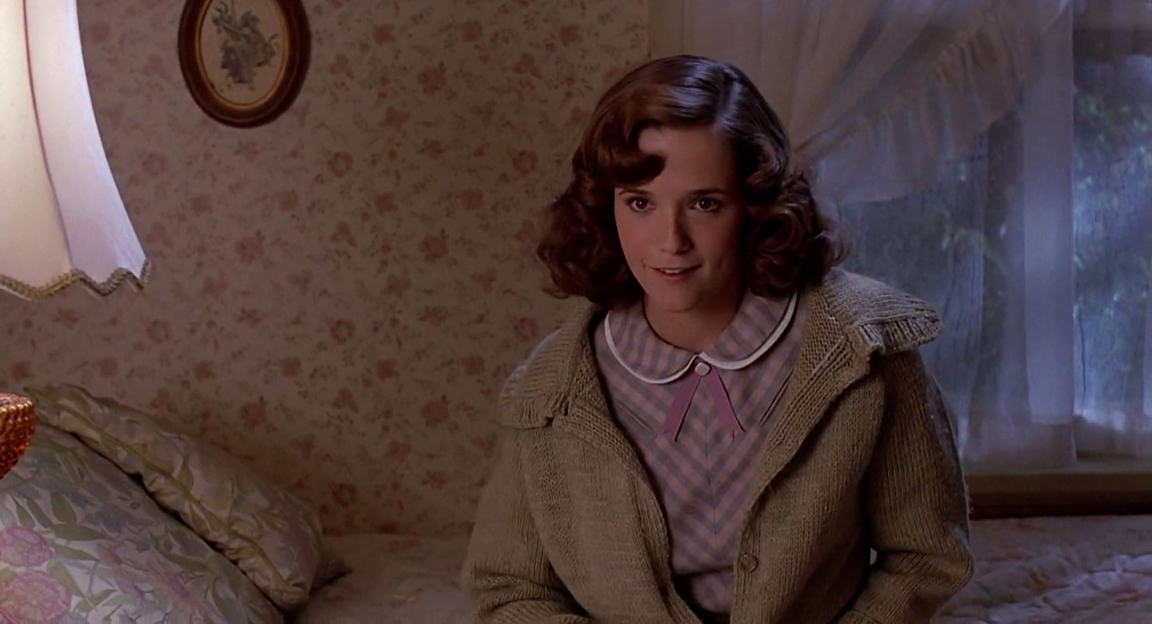
The Imaginary
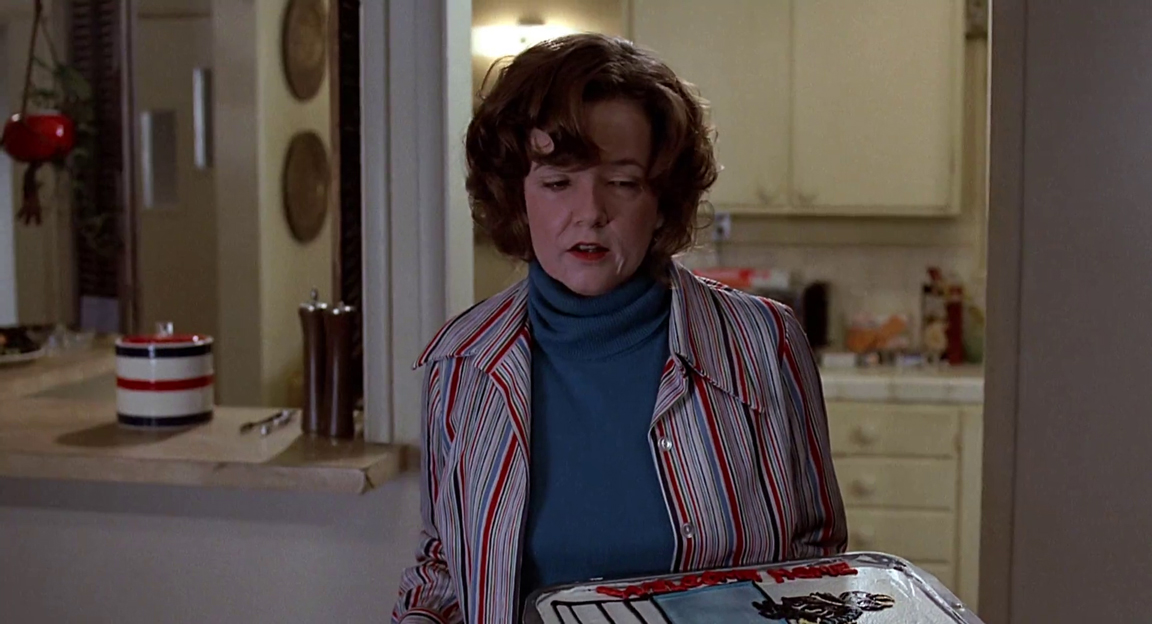
The Symbolic

The Real
This act of looking directly at reality destroys the gap in which love can exist. In this instance, looking too hard, looking too deeply into an object one loses sight of everything. Much like the example Zizek mentions about the early Catholic practice to resist fleshly temptations by imaging beautiful women in the future, old, saggy, etc. This is strangely reminiscent of Buddha’s test of Mara with the seductive daughters turning into old hags as they approached Siddhartha. When Buddhist monks looks at women and feels attraction they imagines their corpses, this is the reality which lies for those who look too hard and miss the complete picture. This concept can be found fully captured by the great technological advances in human representation within digital mediums. Especially in video gaming, the concept of the uncanny valley can be explained as once a digital drawing of a human face reaches a certain level of realism it reaches a climax where it losses all human resemblance and what remains is a haunting uncanny face looking back at us. What went wrong is that nothing went wrong. In trying to realistically represent the human face, one got exactly what one asked for and revealed the horror of the very truth behind our humanity. In focusing so much in representing reality, the real of representation is lost and all that remains is reality without a soul, only a void, an abyss staring back at us resonating through to the same abyss within us. In representing the true imagine of the human face without at the same time capturing the unrealistic, the lies, one ends up with nothing but a void.
What is seen cannot be unseen and there is a price to be paid. Much like often the price of freedom is one’s life, in this instance the cost is equally severe. The image once seen is lost completely and what is left in its place is the darkest nightmares of our own inconsistencies. This direction confrontation with whom one loves, this direct contact with one’s object of desire is reflected and explained by two famous tales: one is the Japanese Shinto creation myth about the first man and women and the other is the Greek story of the character Orpheus and how he journeys to the underworld to find his love. Both Stories end tragically when confronted with reality, the real of the Real. When the very gap that allows the violent intrusion of love to exist is removed, one is left with the full horror, the terrifying nightmare of reality:
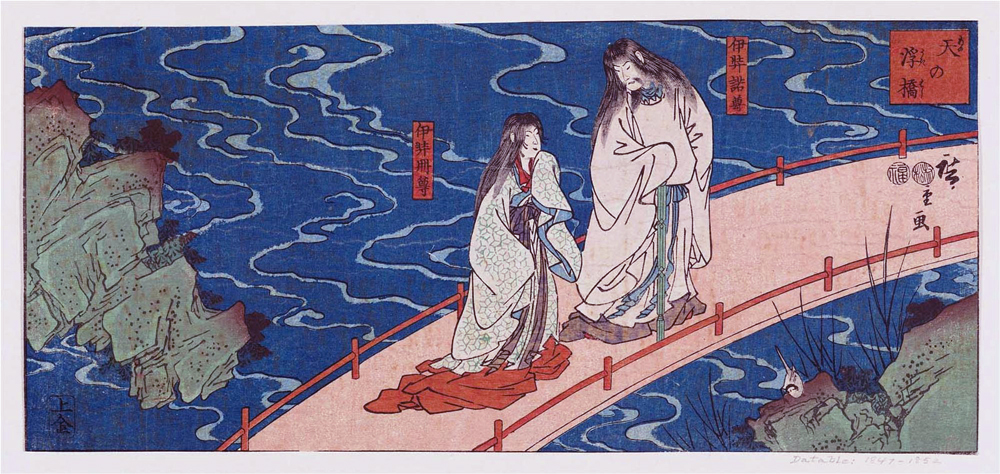
Death of Izanami-no-Mikoto: (http://en.wikipedia.org/wiki/Izanami-no-Mikoto)
Izanagi-no-Mikoto lamented the death of Izanami-no-Mikoto and undertook a journey to Yomi (“the shadowy land of the dead”). He searched for Izanami-no-Mikoto and found her. At first, Izanagi-no-Mikoto could not see her for the shadows hid her appearance. He asked her to return with him. Izanami-no-Mikoto spat out at him, informing Izanagi-no-Mikoto that he was too late. She had already eaten the food of the underworld and was now one with the land of the dead. She could no longer return to the living.
The news shocked Izanagi-no-Mikoto, but he refused to leave her in Yomi. While Izanami-no-Mikoto was sleeping, he took the comb that bound his long hair and set it alight as a torch. Under the sudden burst of light, he saw the horrid form of the once beautiful and graceful Izanami-no-Mikoto. She was now a rotting form of flesh with maggots and foul creatures running over her ravaged body.
Crying out loud, Izanagi-no-Mikoto could no longer control his fear and started to run, intending to return to the living and abandon his death-ridden wife. Izanami-no-Mikoto woke up, shrieking and indignant, and chased after him. She also sent Yakusa-no-ikazuchi-no-kami (Raijin) and shikome (foul women) to hunt for Izanagi-no-Mikoto and bring him back to Yomi.
Izanagi-no-Mikoto burst out of the entrance and pushed a boulder in the mouth of the Yomotsuhirasaka (黄泉津平坂; cavern that was the entrance of Yomi). Izanami-no-Mikoto screamed from behind this impenetrable barricade and told Izanagi-no-Mikoto that if he left her she would destroy 1,000 residents of the living every day. He furiously replied he would give life to 1,500.
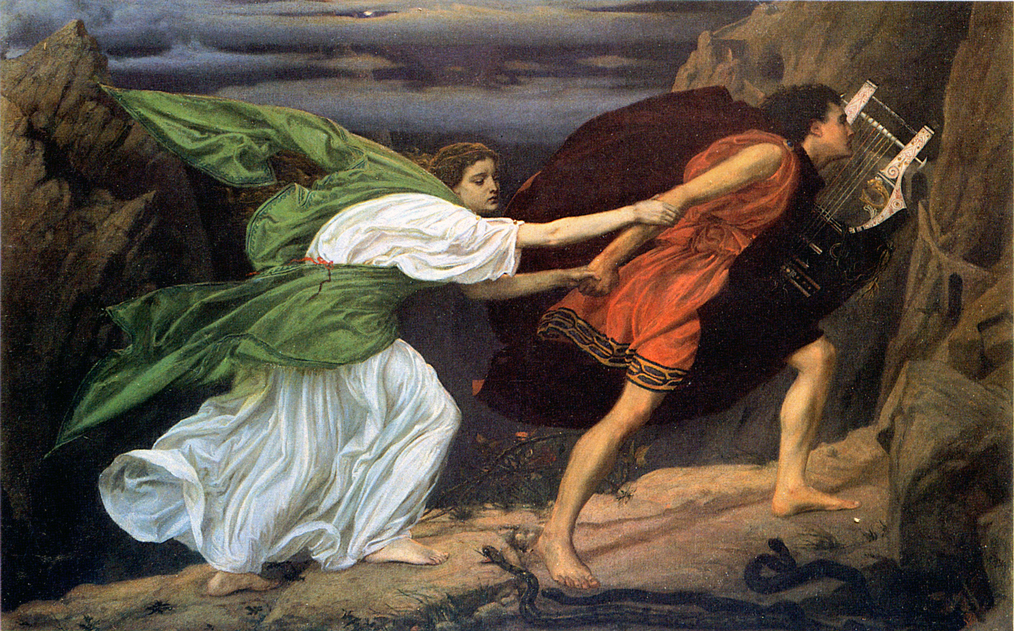
Death of Eurydice: (http://en.wikipedia.org/wiki/Orpheus)
The most famous story in which Orpheus figures is that of his wife Eurydice (sometimes referred to as Euridice and also known as Argiope). While walking among her people, the Cicones, in tall grass at her wedding, Eurydice was set upon by a satyr. In her efforts to escape the satyr, Eurydice fell into a nest of vipers and suffered a fatal bite on her heel. Her body was discovered by Orpheus who, overcome with grief, played such sad and mournful songs that all the nymphs and gods wept. On their advice, Orpheus travelled to the underworld and by his music softened the hearts of Hades and Persephone (he was the only person ever to do so), who agreed to allow Eurydice to return with him to earth on one condition: he should walk in front of her and not look back until they both had reached the upper world. He set off with Eurydice following, and, in his anxiety, as soon as he reached the upper world, he turned to look at her, forgetting that both needed to be in the upper world, and she vanished for the second time, but now forever.
The story in this form belongs to the time of Virgil, who first introduces the name of Aristaeus (by the time of Virgil’s Georgics, the myth has Aristaeus chasing Eurydice when she was bitten by a serpent) and the tragic outcome.[39] Other ancient writers, however, speak of Orpheus’s visit to the underworld in a more negative light; according to Phaedrus in Plato’s Symposium,[40] the infernal gods only “presented an apparition” of Eurydice to him. Ovid says that Eurydice’s death was not caused by fleeing from Aristaeus but by dancing with naiads on her wedding day. In fact, Plato’s representation of Orpheus is that of a coward, as instead of choosing to die in order to be with the one he loved, he instead mocked the gods by trying to go to Hades to bring her back alive. Since his love was not “true”—he did not want to die for love—he was actually punished by the gods, first by giving him only the apparition of his former wife in the underworld, and then by being killed by women.
The story of Eurydice may actually be a late addition to the Orpheus myths. In particular, the name Eurudike (“she whose justice extends widely”) recalls cult-titles attached to Persephone. The myth may have been derived from another Orpheus legend, in which he travels to Tartarus and charms the goddess Hecate.[clarification needed][41]
The myth theme of not looking back, an essential precaution in Jason’s raising of chthonic Brimo Hekate under Medea’s guidance,[42] is reflected in the Biblical story of Lot’s wife when escaping from Sodom. More directly, the story of Orpheus is similar to the ancient Greek tales of Persephone captured by Hades and similar stories of Adonis captive in the underworld. However, the developed form of the Orpheus myth was entwined with the Orphic mystery cults and, later in Rome, with the development of Mithraism and the cult of Sol Invictus.
The question here is what do both those characters see when they look back? In both cases what they saw was the unfiltered rawness of reality. Even with one’s soul mate, or perhaps especially with one’s soul mate, there is a minimal distance required to allow the very violence of the other to be normalized. Hence Zizek’s saying love thy neighbor no thanks. When all mysteries are removed and one see directly into the other person, the very essence of the others’ deepest recesses, it is a violent assault on the one seen and this image once created cannot be undone. There is no turning back, you have robbed yourself of your desire. One can no longer move forward from that point, all is lost, and the path or the image of the other is lost to you. This is what is mean when one when Zizek explains fantasy realized is nightmare. Once one’s fantasy is realized, one loses the very desire of it. Every fantasy obtained is one lost, you can no longer desire it again. Hence the old Persian curse, “may you get all of your hearts desires.” Not only does one lose the other in the process of seeing, in the end, one losses one’s very self within the reflection.
In today’s new age obsession with discovering oneself, one falls into the trap of this ontological paradox. The truth to one’s desire is never a satisfying one. This Lacanian concept is explained by Zizek as such:
Let us take, for example, the Lacanian notion of the imaginary self: this self exists only on the basis of the misrecognition of its own conditions; it is the effect of this misrecognition. So Lacan’s emphasis is not on the supposed incapacity of the self to reflect, to grasp its own conditions – on its being the plaything of inaccessible unconscious forces: his point is that the subject can pay for such a reflction with the loss of his very ontological consistency. It is in this sense that the knowledge which we approach through psychoanalysis is impossible-real: we are on dangerous ground; in getting too close to it we observe suddenly how our consistency, our positivity, is dissolving itself.
In psychoanalysis, knowledge is marked by a lethal dimension: the subject must pay the approach to it with his own being. In other words, to abolish the misrecognition means at the same time to abolish, to dissolve, the ‘substance’ which was supposed to hide itself behind the form-illusion of misrecognition. This ‘substance’ – the only one recognised in psychoanalysis – is, according to Lacan, enjoyment [jouissance]: access to knowledge is then paid with the loss of enjoyment – enjoyment, in its stupidity is possible only on the basis of certain non-knowledge, ignorance. No wonder, then, that the reaction of the analysand to the analyst is often paranoid: by driving him towards knowledge about his desire, the analyst wants effectively to steal form him his most intimate treasure, the kernel of his enjoyment.

Marty’s struggle is his own confrontation of his own ontological inconsistency. The price he pays for seeing too much.
So when one sees, what one ends up doing to the one they love is violently erasing the very substance of their being. To see their love, is to murder them, and in killing one’s love, one kills themselves with the reflection of their action. All you can do is run, and even then, one cannot outrun the image burned and lost in ones’ mind. This is the lesson and the reason in the end of the Oedipus story, he ends up gouging out his own eyes; he blinds himself. In fact, he was blind precisely because he can see, he relied on his sight (seeing the forbidding image of the future), that he could not see. Only when he was blind could he actually start to see. If Oedipus had given his life over to fate, his very fate would have been more generous to him and might have escape his very curse of marrying his mother and killing his father. In seeing and in seeing too much losses the complete picture. Therefore for Oedipus’s story, it is said to be a self-fulfilling prophecy, he fulfilled the conditions through his own actions, not of fate, for he was blinded with knowledge. So how does one see and not see? How does your typical Hollywood protagonist, Marty, escape his fate. Not only does he saves his father, not marry his mother and inherits the kingdom in the end? You must fool the gods, fool the fate’s, and most of all, one must fool one’s self to the point where one necessary blind themselves. To see and not see at the same time.
Hyperion arose, and on the stars
Lifted his curved lids, and kept them wide
Until it ceas’d; and still he kept them wide:
And still they were the same bright, patient stars.
Then with a slow incline of his broad breast,
Like to a diver in the pearly seas,
Forward he stoop’d over the airy shore,
And plung’d all noiseless into the deep night.
Seek not with the eyes
It is interesting to note that Back to the Future has an uncanny similarity to the Oedipus story here, but here told in the Hollywood fashion not only does Oedipus not marry his mother, he saves his father and inherits the kingdom. In the tragedy of Oedipus, it was an accidental encounter with a chariot in Thebes that led Oedipus to murder his own father without knowing so. Here on the other hand in Hollywood, it was an accidental encounter also with an automobile (chariot) that this Oedipus (Marty) ends up saving his own father. If the riddle of the Sphinx is about time and the answer is man, we have here, quite figuratively and literally, the inverse where the riddle is man and the answer is time. How does Marty change his fate? Perhaps this can be answered by considering Hyperion’s call, (why does Hyperion look to the stars?) let us visit Zizek’s reiteration of Jean-Pierre Dupuy’s formula:
we have to accept that, at the level of possibilities, our future is doomed, the catastrophe will take place, it is our fate – and, then, on the background of this acceptance, we should mobilize ourselves to perform the act which will change fate itself. Instead of saying “the future is still open, we still have the time to act and prevent the worst,” one should accept the catastrophe as inevitable, and then act to retroactively undo what is already “written in the stars” as our fate.
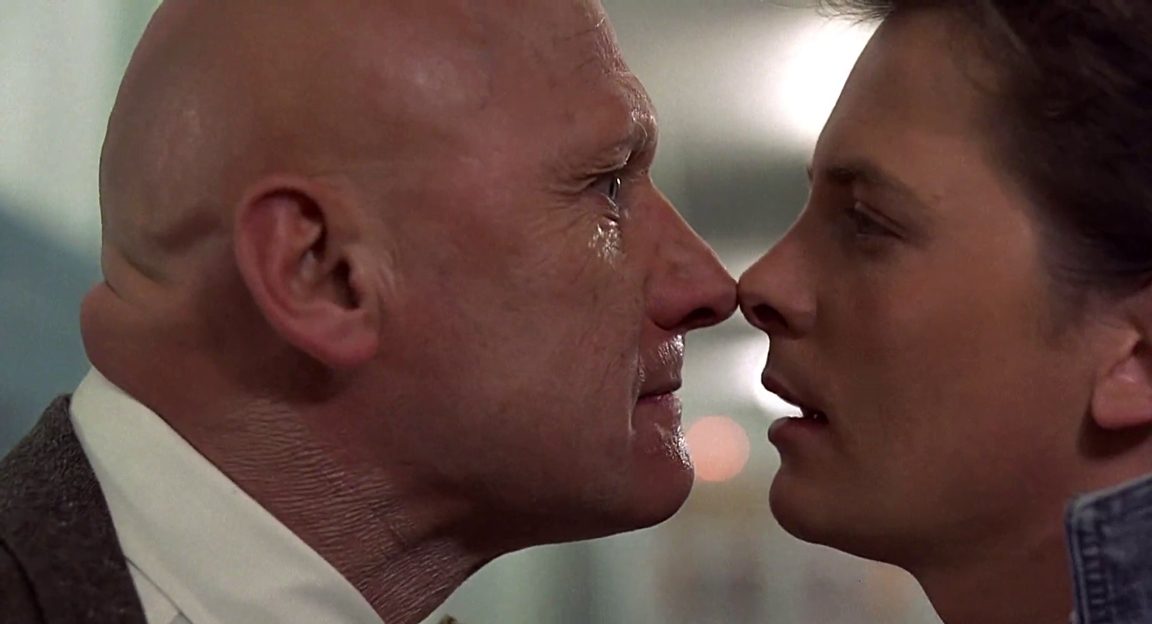
Mr. Strickland: You got a real attitude problem, McFly. You’re a slacker. You remind me of your father when he went here. He was a slacker, too. Marty: Can I go now, Mr. Strickland? Mr. Strickland: I noticed your band is on the roster for the dance auditions after school today. Why even bother, McFly? You don’t have a chance. You’re too much like your old man. No McFly ever amounted to anything in the history of Hill Valley. Marty: Yeah, well, history is gonna change. Marty is right, history will change, history must change. How can one approach the self-fulfilling destiny? How can one change one’s fate?
Much like Marty, in order to go to the future, to change it, we must first go to the past in order to return to a future worth going to. One must face their fate, one must look towards their future and most importantly look past it, over-perceive it, see too much and yet too little to misperceive it. Because of the retroactive nature of history one must not make the mistake of Oedipus and become caught in his own gaze. This act of seeing, a sort of tunnel vision, and the mistakes made in seeing captured by the Oedipus tragedy rings true with the story often told by Zizek about fate:
Recall the Arab story about the appointment in Samara: a servant on an errand in the busy market of Baghdad meets Death ther. Terrified by Death’s gaze, he runs home to his master and asks for a horse he can ride to Samara where Death will not find him. The good master not only provides the servant with a horse, but goes himself to the market, looks for Death and reproaches him for scaring his servant. Death replies: “But I didn’t want to scare your servant. I was just surprised that he was here when I have an appointment with him in Samara tonight…” What if the message of this story is not that a man’s demise is impossible to avoid, that trying to twist free of it will only tighten its grip, but rather its exact opposite: that if one accepts fate as inevitable one can break its grasp? Imagine that upon encountering Death in the market the servant had said: “What’s your problem? If you have something to do with me, do it, otherwise beat it!” Perplexed, Death would have mumbled something like: ”But… we were supposed to meet in Samara, I cannot kill you here!”
In the instance when one is confronted by inevitable fate, escape is never an option. If one had the ability to completely change it, it would have been done already. The only reason why one is caught in the situation in the first place is that they lack the ability to be anywhere else. When faced with inevitability like the slave in the story, one can consider the old Taoist proverb and do nothing for “When nothing is done, nothing is left undone.” This doing nothing can be seen in two main parts of the movie:
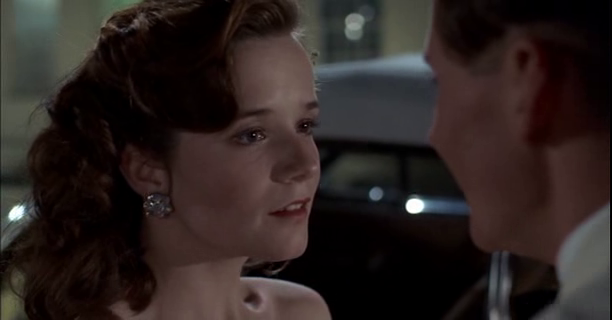
George punches Biff out and saves the girl. Marty was not in the scene, the audience was conscious of his absence.
The first absence can be found where Marty regains his ontological consistency through seeing and not seeing. Only when Marty was removed from the scene could fate be confronted as such. Regardless of the knowledge Marty had, it never had any effect on the very situation at hand. It was only when Marty does not fight could fate be escaped. This scene of absence of action and fate confronted was doubled at the ending dance scene where Marty merely acted as a spectator:
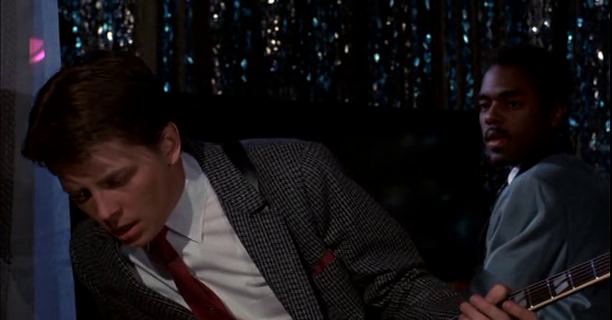
Marty only acts as a spectator. He no longer runs from his possible erasure. He acts only as a gaze, a consciousness of a possible future.
Marty must be present in order to witness this occurance. Witness his own inability to change fate and with his gaze confront fate. What Oedipus could not or would not and failed to do. The second occurance of Marty as the spectator of fate can be found at the ending:
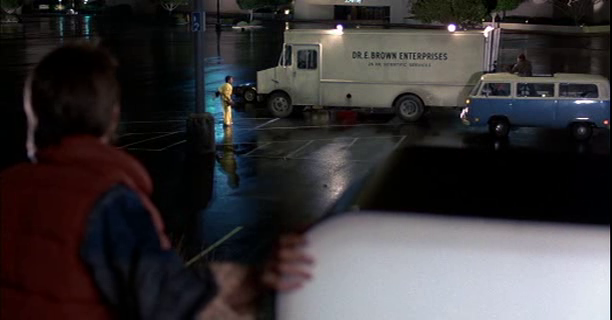
Marty actively tries to alter his fate only to act as merely a spectator the moment it is realized not because of his inability to change it, he lends his gaze only to confront it, the only way fate can be altered is to know and not know.
Much like the perfect addition to Roberto Benigni’s Life is Beautiful that Zizek always mentions, where not only does the son know that his father is creating these lies to protect him from reality with this game he is playing this game fully knowing only to protect the father from that same reality and only pretend to not know to make his father happy. This doubling of truth is necessary to fool the gods so to speak. Much like the example in quantum mechanics where Zizek explains that matter can exist and not exist at the same time is with this borrowing of energy. Matter that does not exist borrow energy to exist and return the energy before it is noticed that it was missing. There is a divine time gap, or a space of articulation in which inconsistencies are normalized, a realm in which truth and false exist within the same chronological gap. Much like in the movie, the entire narrative lasted merely minutes within the time of narration. The movie began at the scene and ends at the very same scene with only a difference of one minute.
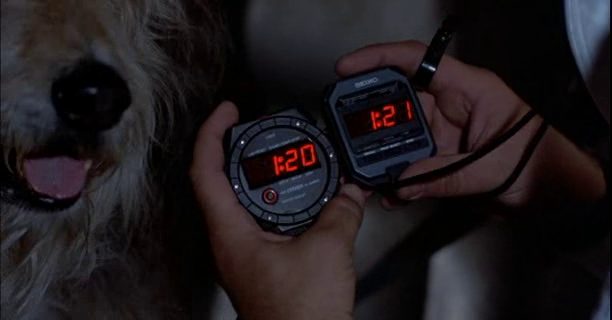
This gap in time was foreshadowed to the audience in the very beginning of the movie.
To Doc, who is lying on the ground. Marty left to the past only to return to the present (the future) in a manner in which it seems like he never left at all. Where all the coordinates of the scene is the same and yet everything is changed. Much like confronting the inevitability of fate, nothing changes yet everything changes. In order to fool the gods, one must play along, one must allow themselves to be fooled fully knowingly accept perception and misconception. To escape fate, the gaze must be diverted and to divert the gaze is to see and not see:
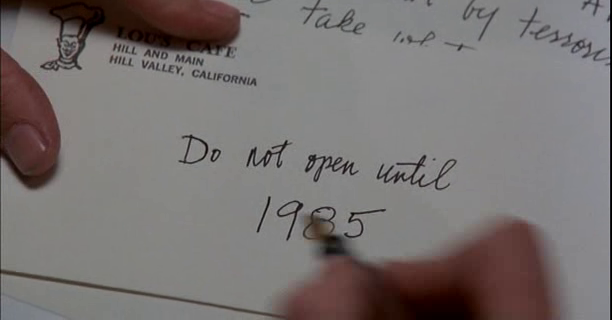
Marty writes the letter, a sign of the future, for Doc to discover to escape his fate.
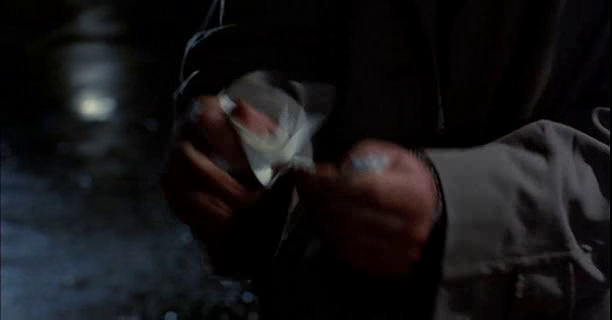
Doc: What’s the meaning of this? Marty: You’ll find out in 30 years. Doc: It’s about the future, isn’t it? Information about the future. Marty: Wait a minute. Doc: I warned you about this, kid. The consequences could be disastrous! Marty: Doc, that’s a risk you’re going to have to take. Your life depends on it! Doc: No! I refuse to accept the responsibility.
This scene was made for the audience. It was to capture our gaze and divert our attention. Doc was smart enough to understand the very responsibility to seeing too much or too little. He refuses to merely be duped into accepting fate and its self-fulfilling nature. He rips the message from the future apart for our eyes yet fully knowing the dare consequences of his fate. To choose to know and not know at the same time, to perceive truth, to directly confront fate. He knows enough to not to run yet doesn’t know enough to run, a self conditioning for self-fulfilling one’s own destiny under ones own choice. To fool the gods, one fool’s the self first in the process. Had Oedipus knew how to do this, he would have escaped and would not have to gouge out his eyes in order to learn this lesson.
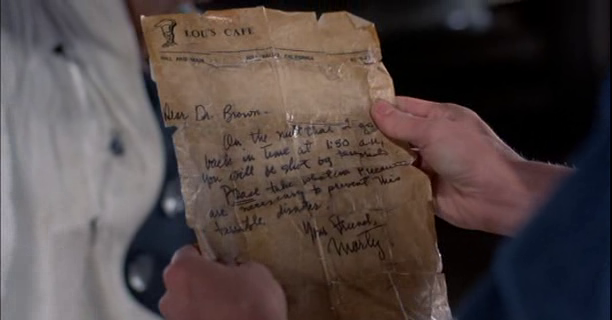
Marty: No!… You’re alive. Bulletproof vest? How did you know? I never got a chance to tell you. What about all that talk about screwing up future events? The space-time continuum? Doc: Well, I figured, what the hell.
Only when the gaze is diverted and the act is done can the message be re-materialized. One must perceive the truth as a misconception and play the role of the fool to the tilt. This scene was made for our eyes, for the only change was withing our cognitive understanding of the narrative, the narrative does not change. The coordinates of the story remains the same, Doc does not die regardless. The audience was fooled, our gaze diverted, a gap opened where the gods can’t see. A redundant retelling of the truth where there leaves room for the misconception to take place. As long as the energy is returned before the gaze can catch on, change can take place as if nothing happened.
This gap can only exist when the gaze is diverted, not completely conscious. Much like historical revolutionary potential in the act of revolution must be blind to those whom are in the very struggle, it not the ontological consistency of their very actions fall apart. This is attributed to the nature of time in which the past never truly existed, it exists only when someone is looking and this gaze is not an omnipotent one. The example in the movie would be the last scene of the past of Marty’s parents:
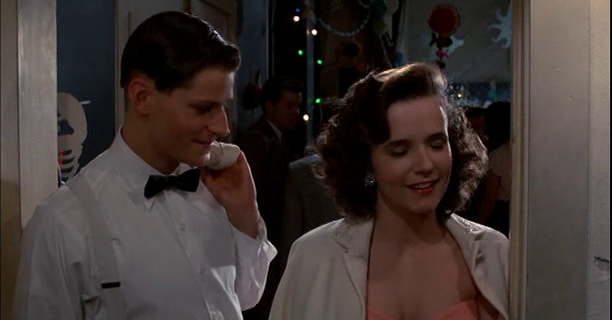
Loraine: Marty. Such a nice name.
Marty already always was part of his on ontological cause. A truth that was blind to him allowed him to escape his fate. His misconception allowed him to confront fate and change the course of history. A future that he goes back to, back to the future present that was created. Or more correctly because of the retroactive creation of history, a present that always already was. What actually happens is of little consequence in this regard, the past is always nonexistent, but the present or the future is the very construction of this remembrance, remembrance in the messianic Benjamin sense, where change is possible within the constraints of fate by remembering a past of an impossible future: the act of Total Recall where one retroactively recreates the conditions of a present that exists in a future yet to come. Like a dream, one sees and does not see:
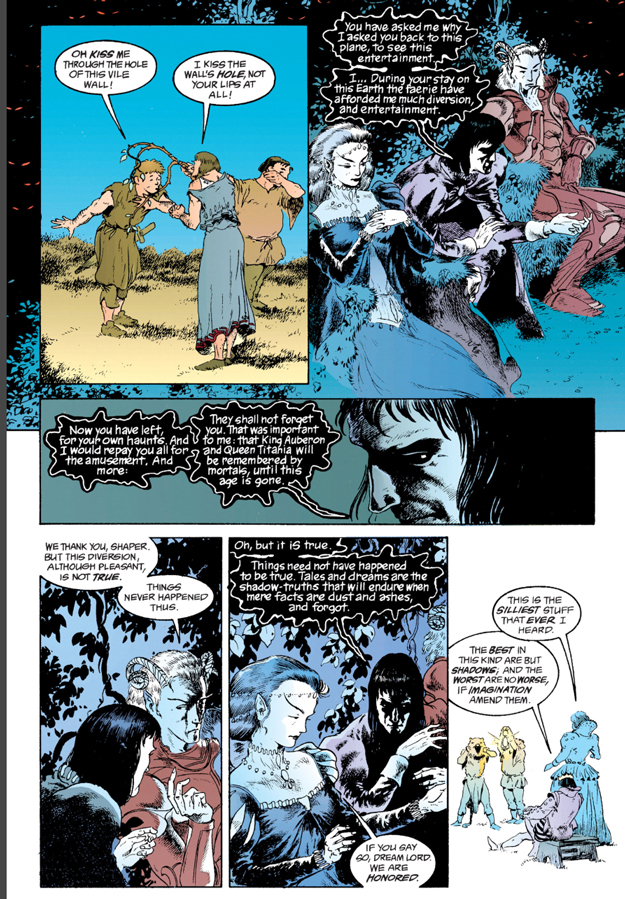
This illustrates Benjamin’s urge for remembrance. The constraints of the present is always conceived within the setting, in chronological narrative of history, of how things have “Always was” which seals the conditions for the future. But by precisely accepting this inevitability, the very nature of historical time, can the future present always already be changed. Let not those in power rob us of a future by letting us forget the past.
When in love, one must fall. One must suffer. For only in this light of suffering, this self deception, can there be any meaning in the act. Only in this light can the linear nature one’s destiny be confronted, how one is not only a pawn within the gaze of fate and the gods. Even the gods can be fooled and even the gods must suffer in order for use to change our fate as Zizek explains only a suffering god can save us now:
that of a suffering God: not a triumphalist God who always wins at the end, although “his ways are mysterious,” since he secretly pulls all the strings; not a God who exerts cold justice, since he is by definition always right; but a God who – like the suffering Christ on the Cross – is agonized, assumes the burden of suffering, in solidarity with the human misery. It was already Schelling who wrote: “God is a life, not merely a being. But all life has a fate and is subject to suffering and becoming. /…/ Without the concept of a humanly suffering God /…/ all of history remains incomprehensible.” Why? Because God’s suffering implies that He is involved in history, affected by it, not just a transcendent Master pulling the strings from above: God’s suffering means that human history is not just a theater of shadows, but the place of the real struggle, the struggle in which the Absolute itself is involved and its fate is decided.
Fully knowing the consequences of an inevitable future one must like the Doc and say, “what the hell” and fully jump in. One fully knowing the consequences of love, must love. Purple is the color of love and
if it’s purple someone’s gonna die

